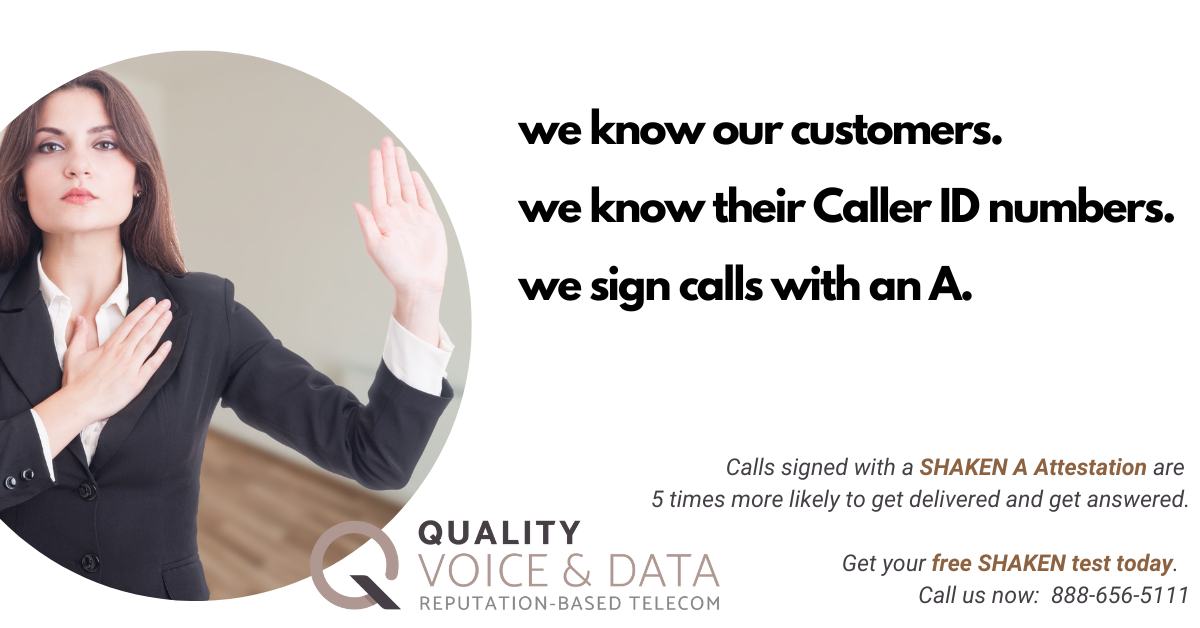STIR/SHAKEN Attestation levels were developed by the Robocall Taskforce, established by the Federal Communications Commission in response to the overwhelming problem of illegal robocalls. Essentially, the attestation levels are designed to protect the integrity of the telecom networks and provide a way to signal confidence levels to other carriers that the calls can be trusted, and at what level.
What are the SHAKEN Attestation Levels?
STIR SHAKEN attestation levels were developed as part of the STIR/SHAKEN telecom protocol which was implemented in phases over the last two years. STIR/SHAKEN was developed in response to the increasing problem of robocalls and caller ID spoofing. To combat this issue, SHAKEN attestation verifies the degree to which the originating telecom carrier knows their customer (KYC) and if the telecom carrier knows the customer has authorization to use the Caller ID number they are inserting into the meta data of the call.
This attestation provides a simple way for carriers to communicate with each other about the potential legitimacy of the phone call.
There are three SHAKEN attestation levels, A, B, and C
A-Attestation (Full attestation) indicates that the telecom carrier that originated the call knows the customer that initiated the call and the customer is authorized to use the Caller ID that the call is being originated from.
B-Attestation (Partial attestation) indicates that the telecom carrier that originated the call knows the customer that initiated the call but does not have an LOA indicating that the customer is authorized to use the Caller ID that the call is being originated from.
C-Attestation (Gateway attestation) means that the telecom carrier does not know the caller’s identity and the source of the call cannot be identified. This simply means that the call has been routed through a gateway that is STIR-SHAKEN compliant. Calls with this level of attestation are most likely to be blocked or tagged as spam.
Telecom carriers must use the appropriate level of SHAKEN attestation when signing calls. If they do not, they could lose their telecom licenses. As such, telecom carriers have developed procedures to ensure that calls are properly signed with the appropriate level of SHAKEN attestation.
What does an attestation rating of C mean for a call?
An attestation rating of C means that the telecom carrier does not know the caller’s identity. This is the lowest level of attestation. Some carriers have a policy to block all calls that are transmitted with a C attestation.
What does an attestation rating of B mean for a call?
An attestation rating of B means that the telecom carrier knows the caller’s identity (KYC), but does not have an LOA on file documenting that the caller has authorization to use the Caller ID number.
Why is STIR/SHAKEN so important?
STIR SHAKEN attestation levels are a set of technologies that aim to combat robocalling. The goal is to make it more difficult for scammers to disguise their identities, making it easier for regulators and law enforcement to find and penalize the illegal robocallers.
This is important because caller ID spoofing is a common tactic used by scammers to trick people into thinking they are being called by a legitimate business or person. By making it more difficult for scammers to spoof caller ID, STIR/SHAKEN makes it easier for consumers to know who is really calling them.
STIR/SHAKEN is also important because it is a step towards creating a trustworthy marketing and communications channel. As we become increasingly reliant on our phones for communication, it is important that we have confidence that the calls are not scammers or other illegal robocallers trying to trick us and exploit us.
STIR/SHAKEN Attestation Levels from Quality Voice & Data
As a SHAKEN Service Provider, Quality Voice & Data (QVD) can help your company increase your outbound call answer rate. Our flagship product, Trusted Call Completion® is a QVD service that signs all calls with an A Attestation. This ensures your company's calls are delivered to each end telephone carrier (not blocked) and not labeled with spam, scam or telemarketer. Outbound teleservices (sales) organizations and other companies that need to contact existing customers or prospects can benefit from using QVD's services.
QVD's A Attestation will legitimize your company's calls and improve customer satisfaction. If you are looking for a way to improve your company's call completion rates and ensure that your calls are answered, then consider using QVD's services.
Contact us today to learn more about our services and how we can help you reach your customers and prospects with fewer outbound call attempts.
Angela Garfinkel currently serves as Director for Quality Voice & Data. With 30+ years of call center and business process outsourcing experience, Angela provides the QVD team with key insights to support product development, marketing and sales.
Angela Garfinkel, Director at Quality Voice and Data, brings over 30 years of experience in call center and business process outsourcing. Well known in the telemarketing and telecommunications industry, she co-authored a course for The Direct Marketing Association and actively participates in professional groups like PACE. Her educational background includes an MBA and an undergraduate degree in Telecommunications Management from the University of Nebraska.


